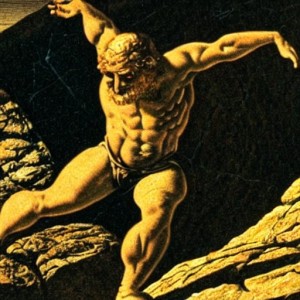The punishment of the gods or the joy of liberated labor
It is difficult to find at least one work by Albert Camus, free from philosophical concepts. Such is the analysis of his many critics. However, the writer did not recognize himself as a philosopher in the classical sense of the word. But the “The Myth of Sisyphus”, written in 1942, can without exaggeration be considered a purely philosophical treatise.
True, Camus called his work “an essay on the absurd.” This genre was not chosen by him by chance, since it presupposes a free composition of the work and leaves the author with the right to remain at least a little writer, and not just a philosopher.
The composition of the essay is such that the myth of Sisyphus itself occupies only an insignificant part of the work and is placed in the epilogue. He summarizes the study of the problem of the absurdity of the existence of an individual. Sisyphus, according to the writer, is a happy person, because he rejects the gods and personally controls his fate. True, it is difficult for a reader with traditional thinking to imagine a happy man who is engaged in hard labor day and night. The rebellious mood of Camus himself, his desire to challenge the Higher Forces, clearly manifested here.
The problems of the essay “The Myth of Sisyphus”, in essence, are not new. The question of the meaning or meaninglessness of existence has always been a favorite subject of study of philosophers. He was engaged in many schools and the greatest single minds. Many scientists have come to the conclusion that human life is absurd. Camus takes this conclusion as the starting point of his reasoning.
Studying human experience, he believes that man isolates eternal truths about himself and the surrounding space not by knowing life, but by means of feelings. The main thing here is a sense of absurdity, which casts doubt on the existence of God and the rationality of social structure.
But, in this way, one has to deny any aesthetic norms and rules. In a state of absurdity, everything is permitted. The only meaning is the fullness of life experiences. Therefore, the absurdity should not be destroyed by suicide, you just need to live it by making your choice. In the life of everyone there comes a time when it is necessary to choose between action and contemplation. This is called: to become a person. This conclusion is made by Camus.
The author himself does not believe in the harmony of man with nature. She, in his opinion, is very hostile to sentient beings. Therefore, each person can understand the other only on an individual, absurd level. What then are the general laws of perception?
Camus conducts a serious analysis of the philosophical views of those thinkers who touched on the question of absurdity before him. Among them: Kierkegaard, Shestov, Dostoevsky, Husserl, Nietzsche and other philosophers. However, it is worth recognizing that, as a stable doctrine, absurdism is owed specifically to Camus.
Sisyphus is not alone at the top, where he once again rolled his stone. The storyline of the essay is such that before we meet with many historical and literary characters of the past, Camus are interesting in terms of confirming their conclusions. This is Kirillov from Dostoevsky’s Demons; Don Giovanni, Commander, Alcest Moliere; Adrienne Lekuvrer and many others.
“I have chosen only those heroes who set as their goal the exhaustion of life …”, Camus admitted.
What, of course, is difficult to disagree with the writer, is that each person has his own choice: absurd or reasonable.
